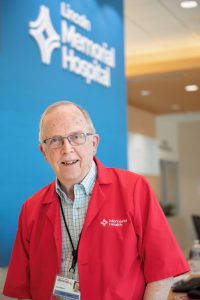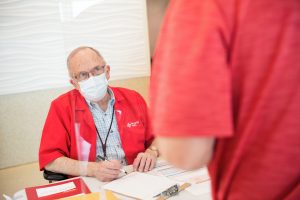Brain Surgery Minimizes Essential Tremors for Longtime Lincoln Memorial Hospital Volunteer
 For 20 years, Alan Kline, now 76, had tried a number of different medications to control the essential tremors that increasingly complicated simple tasks like eating, drinking or writing.
For 20 years, Alan Kline, now 76, had tried a number of different medications to control the essential tremors that increasingly complicated simple tasks like eating, drinking or writing.
The eleven-year volunteer at Lincoln Memorial Hospital (LMH) grew increasingly isolated as he tried to avoid social situations that would highlight the dexterity issues brought on by the tremors.
“Everyday tasks suddenly became a big emotional thing because I was fumbling,” he said. “I couldn’t hold a glass of water without gripping it with both hands. Restaurants became a challenge. I began to really dread social occasions.”
Alan eventually consulted with Jeffrey Cozzens, MD, chair of neurosurgery at Southern Illinois University School of Medicine in Springfield.
Dr. Cozzens recommended Deep Brain Stimulation, which is electric stimulation delivered to the brain through two electrodes implanted into the brain. The electrodes, which connect to a neuro-stimulator or battery, then correctly deliver the proper electrical stimulation to control the tremors.
Alan underwent the surgeries at Springfield Memorial Hospital in early summer of 2020, which greatly minimized the tremors. His right hand is now 95% tremor free, while his left hand is 80% tremor free.
 He has resumed volunteering at LMH and enjoys helping out one morning a week. He works the front desk, transports wheelchair patients to their destinations in the hospital, accompanies patients to diagnostic rooms, changes linens for treatment beds in the rehabilitation area, restocks cabinets in the treatment rooms with linens and performs other tasks.
He has resumed volunteering at LMH and enjoys helping out one morning a week. He works the front desk, transports wheelchair patients to their destinations in the hospital, accompanies patients to diagnostic rooms, changes linens for treatment beds in the rehabilitation area, restocks cabinets in the treatment rooms with linens and performs other tasks.
“By the time I’m done, I’ve usually averaged two to three miles in the morning with all the back and forth, up and down,” he said. “The appreciation expressed by the staff for the volunteers is gratifying. They went a year without volunteers due to COVID-19. Changing that many beds every morning cut down on the time they could spend with patients so they are glad for the volunteer help.”
Without the self-consciousness of the essential tremors, Alan is no longer so choosy about attending social events. He and his wife Barb (high school sweethearts) are active in their local church, and he enjoys working with her on jigsaw puzzles, adult coloring, gardening and attending their grandsons’ activities.
“Everyone shakes their head in awe,” he said of the change to his quality of life as a result of the brain surgery. “They are as amazed as I was.”